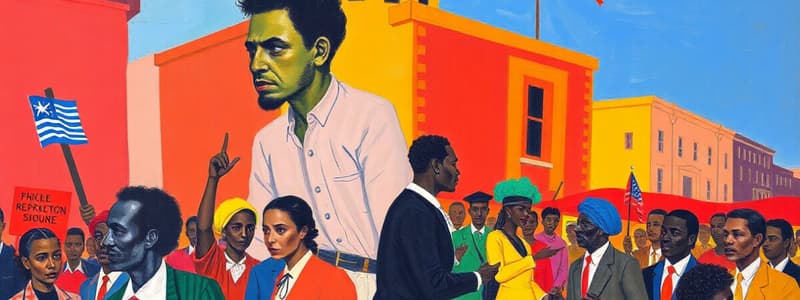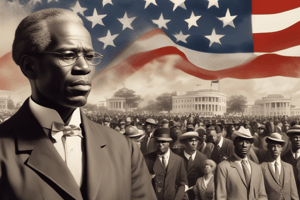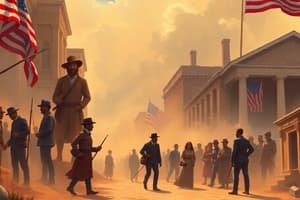Podcast
Questions and Answers
What term refers to wealthy industrialists perceived as exploiting workers and resources?
What term refers to wealthy industrialists perceived as exploiting workers and resources?
- Monopolist
- Robber Baron (correct)
- Capitalist
- Philanthropist
Which doctrine was extended by the Roosevelt Corollary to justify U.S. intervention in Latin America?
Which doctrine was extended by the Roosevelt Corollary to justify U.S. intervention in Latin America?
- Manifest Destiny
- Monroe Doctrine (correct)
- Gospel of Wealth
- Open Door Policy
Which amendment granted women the right to vote in the United States?
Which amendment granted women the right to vote in the United States?
- 18th Amendment
- 21st Amendment
- 19th Amendment (correct)
- 17th Amendment
What was one significant outcome of the Spanish-American War for the United States?
What was one significant outcome of the Spanish-American War for the United States?
What concept justified economic inequality and imperialism by promoting 'survival of the fittest'?
What concept justified economic inequality and imperialism by promoting 'survival of the fittest'?
Which of the following describes the impact of Henry Ford's assembly line?
Which of the following describes the impact of Henry Ford's assembly line?
What was a direct result of the Palmer Raids during the Red Scare?
What was a direct result of the Palmer Raids during the Red Scare?
What adverse effect is associated with the Prohibition era?
What adverse effect is associated with the Prohibition era?
What was Lincoln's primary goal for Reconstruction?
What was Lincoln's primary goal for Reconstruction?
Which of the following were accomplishments of Reconstruction?
Which of the following were accomplishments of Reconstruction?
What was the outcome of the Compromise of 1877?
What was the outcome of the Compromise of 1877?
What economic system forced freedmen into labor contracts after the Civil War?
What economic system forced freedmen into labor contracts after the Civil War?
What was the primary purpose of the KKK during Reconstruction?
What was the primary purpose of the KKK during Reconstruction?
Which group sought to restore white dominance in the South during Reconstruction?
Which group sought to restore white dominance in the South during Reconstruction?
What was one of Booker T. Washington's main focuses for African Americans?
What was one of Booker T. Washington's main focuses for African Americans?
What was a significant impact of the transcontinental railroad on Native Americans?
What was a significant impact of the transcontinental railroad on Native Americans?
Flashcards
Carpetbaggers
Carpetbaggers
Northerners who moved to the South during Reconstruction, often seeking financial or political advantages.
Ten Percent Plan
Ten Percent Plan
Lincoln's plan to readmit Southern states into the Union, requiring 10% of their voters to pledge loyalty.
Lincoln's Goal for Reconstruction
Lincoln's Goal for Reconstruction
Reconstruction aimed to reunite the nation, heal the South, and end slavery.
Radical Republican Goal for Reconstruction
Radical Republican Goal for Reconstruction
Signup and view all the flashcards
Impeachment of Andrew Johnson
Impeachment of Andrew Johnson
Signup and view all the flashcards
Freedmen's Bureau
Freedmen's Bureau
Signup and view all the flashcards
Sharecropping
Sharecropping
Signup and view all the flashcards
Redeemers
Redeemers
Signup and view all the flashcards
Manifest Destiny
Manifest Destiny
Signup and view all the flashcards
Robber Baron
Robber Baron
Signup and view all the flashcards
Social Darwinism
Social Darwinism
Signup and view all the flashcards
Gospel of Wealth
Gospel of Wealth
Signup and view all the flashcards
Spark That Started WWI
Spark That Started WWI
Signup and view all the flashcards
19th Amendment
19th Amendment
Signup and view all the flashcards
18th Amendment
18th Amendment
Signup and view all the flashcards
Red Scare in the 1920s
Red Scare in the 1920s
Signup and view all the flashcards
Study Notes
Reconstruction Era
- Carpetbaggers: Northerners who moved South during Reconstruction for financial or political gain.
- Lincoln's Reconstruction Goal: Quick reunification and healing of the South, ending slavery.
- Radical Republican Goal: Punish the South, secure civil rights, empower freed African Americans.
- Ten Percent Plan: Lincoln's plan for Southern states' readmission upon 10% voter allegiance.
- Impeachment of Andrew Johnson: Johnson violated the Tenure of Office Act; avoided removal by one Senate vote.
- Reconstruction Successes: 13th, 14th, and 15th Amendments (abolishing slavery, granting citizenship, protecting voting rights).
- Compromise of 1877 Outcome: Rutherford B. Hayes became president; federal troops withdrawn from South, ending Reconstruction.
- Hayes' Reconstruction End: Removal of federal troops, allowing white Democratic control.
- African American Party Affiliation: Republican Party after the 15th Amendment.
- KKK: White supremacist group opposing African American rights through violence and intimidation.
- Black Codes: Laws limiting freedmen's freedom, forcing labor contracts.
- Redeemers: Southern Democrats aiming to regain white dominance.
- Sharecropping: Freedmen worked land for share of crops, often resulting in debt.
- Enforcement Acts: Laws aimed at combating the KKK and protecting African American voting rights.
- Freedmen's Bureau: Agency aiding freed slaves with education, food, and legal support.
Late 19th and Early 20th Century
- Transcontinental Railroad: Boosted trade, connected markets, expanded industry, facilitated westward migration, and cultural exchange. However, it negatively impacted Native Americans through forced relocation, buffalo destruction, and land/cultural loss.
- Labor Unions: Groups seeking better pay, shorter hours, and safer working conditions for laborers.
- Robber Barons: Wealthy industrialists, perceived as exploiting workers and resources.
- Monopoly: A single company controlling an entire industry, eliminating competition.
- Gospel of Wealth: Andrew Carnegie's belief that wealth should benefit society.
- Social Darwinism: "Survival of the fittest," justifying economic inequality and imperialism.
- Manifest Destiny: Belief in U.S. expansion to spread democracy and capitalism globally.
- Spanish-American War Significance: Made the U.S. a formidable global power, leading to control over territories like the Philippines and Puerto Rico.
- Open Door Policy: Ensuring equal trading rights in China for all nations.
- Anti-Imperialists: Opposed U.S. colonization due to moral and democratic concerns.
- Roosevelt Corollary: Expanded the Monroe Doctrine, permitting U.S. intervention in Latin America.
- "Speak Softly and Carry a Big Stick": Roosevelt's foreign policy of diplomacy backed by military strength.
- World War I Spark: Assassination of Archduke Franz Ferdinand.
- Treaty of Versailles' WWII Contribution: Harsh terms against Germany led to economic hardship, resentment, and fueled Nazism.
- Woodrow Wilson's Fourteen Points: Post-war peace plan including the League of Nations to prevent future conflicts.
- Coolidge's Administrative Fix: Restored public trust and reduced government corruption.
- Henry Ford's Assembly Line Impact: Made cars affordable, boosted industrial efficiency, and stimulated economic growth.
- 19th Amendment: Granted women the right to vote.
- Palmer Raids: Actions in response to the Red Scare (fear of communism) after WWI.
- 18th Amendment: Prohibition of alcohol; enforcement faced challenges due to illegal production and consumption.
- Prohibition Side Effects: Rise in organized crime and "bootlegging."
- Red Scare in the 1920s: Fear of communists and anarchists following the Russian Revolution.
Early 20th Century Continued
- Native Americans and Citizenship: Not considered citizens until the Indian Citizenship Act.
- Roaring Twenties: Economic boom, cultural change, and social freedom.
- Sacco and Vanzetti: Italian anarchists, executed for robbery and murder, symbolizing anti-immigrant bias.
Studying That Suits You
Use AI to generate personalized quizzes and flashcards to suit your learning preferences.




